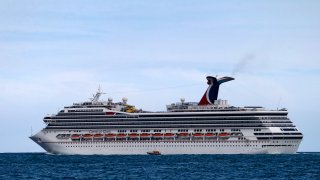
Top Carnival Corp. executives told a skeptical federal judge Wednesday that progress is being made to curb the world's largest cruise line's chronic ocean pollution problems.
At one point in a hearing, Senior U.S. District Judge Patricia Seitz asked Carnival Chairman Micky Arison directly whether he'd taken any steps personally to improve the environmental compliance of the ships.
"We're totally committed," said Arison, who also owns the NBA's Miami Heat. "How much more can we be saying as a management team that we're totally committed? I don't know how much more we could do."
Carnival is halfway through five years' probation for violating environmental laws stemming from a 2016 criminal case, paying a $40 million fine. The Miami-based cruise line admitted last year that its ships had continued to pollute the oceans, a probation violation which triggered an additional $20 million fine.
Among the most pressing environmental problems are dumping "gray water" into sensitive waterways, discharge of plastic along with food waste into the water and changing a corporate culture that did not previously place enough emphasis on compliance with environmental laws.
The company, which has more than 100 ships across nine brands and more than 120,000 employees, insists it is making progress on all fronts. In one recent court filing, Carnival said it intends to cut single-use plastics in half by 2021, is testing food waste "digesters" intended to prevent non-food from getting mixed in and is increasing spending on ethics and compliance by more than $18 million this year.
"What changed is going from a high priority to the high priority," Carnival CEO Arnold Donald told the judge. "We're not saying we're done. We're not satisfied. We know we have work to do."
U.S. & World
The day's top national and international news.
Seitz said that, for the next hearing set for April, there should be better ways to specifically measure any improvements Carnival is making toward environmental compliance.
"I'm going to accept for now that you are committed to the long term," the judge said. "I don't think this company wants to move this slowly."
Assistant U.S. Attorney Richard Udell said independent audits show "a lot of problems on a lot of ships." But he also said Carnival deserves credit for the steps it has taken so far.
"There is positive movement. We're still saying Carnival is not there," Udell said.



